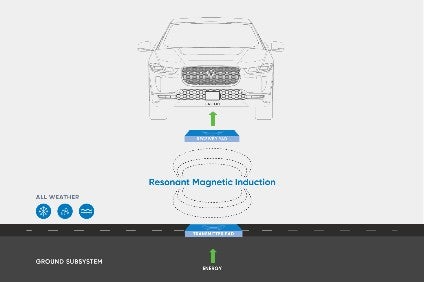
Tata Motors' Jaguar Land Rover said it had agreed to support Oslo, Norway, with the world's first high powered wireless taxis.
In a programme known as 'ElectriCity', the automaker will join Nordic taxi operator Cabonline (NorgesTaxi AS), the region's largest charge point operator Fortum Recharge, US technology developer Momentum Dynamics and the City of Oslo to build wireless, high powered charging infrastructure for taxis in the capital.

Discover B2B Marketing That Performs
Combine business intelligence and editorial excellence to reach engaged professionals across 36 leading media platforms.
The project is claimed to be the first wireless high powered charging system for electric taxis in the world and, by providing a charging infrastructure model that can be implemented almost anywhere, it will help the rapid adoption of electric vehicles globally.
Fortum Recharge, who will be supporting the installation and electrification of the project, identified the need for a more efficient charging experience for taxi drivers in Oslo and enlisted the support of Momentum Dynamics in integrating the wireless charging infrastructure.
JLR will provide 25 Jaguar I-Pace models to Cabonline, the largest taxi network in the Nordics. The SUV has been designed to use Momentum Dynamic's wireless charging. Engineers and technicians from both companies helped test the system while Cabonline signed up to operate the fleet as part of Oslo's ElectriCity programme.
For usage efficiency, taxi drivers need a charging system that does not take them off route during their working hours.
Multiple charging plates rated at 50-75 kilowatts each, are installed in the ground in series at pick up and drop off points.
This allows each equipped taxi to charge while queuing for the next fare. The system, which uses no cables and is below ground, requires no physical connection between charger and vehicle, engages automatically and provides on average 6-8 minutes of energy per charge up to 50kW.
The taxi then receives multiple charges throughout the day on its return to the rank, maintaining a high battery state of charge and the ability to remain in 24/7 service without driving range restrictions.
Ralf Speth, Jaguar Land Rover Chief Executive, said: "The taxi industry is the ideal test bed for wireless charging, and indeed for high-mileage electric mobility across the board.
"The inherently safe, energy efficient and high-powered wireless charging platform will prove critical for electric fleets, as the infrastructure is more effective than refuelling a conventional vehicle.
Oslo will be the world's first metropolitan area to install wireless, induction-based high-powered charging stations for electric taxis, in a bid to make its cab system emission free as early as 2024.
Norway wants to go even further and is mandating all new cars sold in the country by 2025 are zero emission.
Arild Hermstad, the city's vice mayor for environment and transport, said: "As part of our commitment to reducing emissions by 95% before 2030, we have put many exciting measures in place, but transport continues to be a key challenge. By improving infrastructure and providing better charging to the taxi industry, we are confident that by 2024 all taxis in Oslo will be zero emission. To reach our goal, the public sector, politicians and private enterprises must come together."






